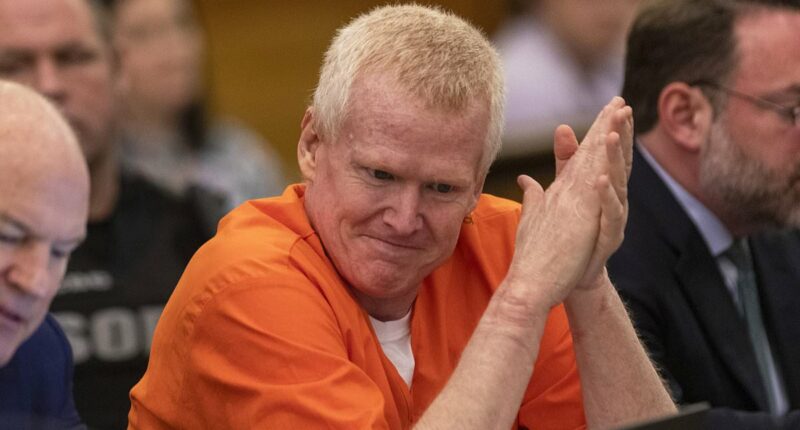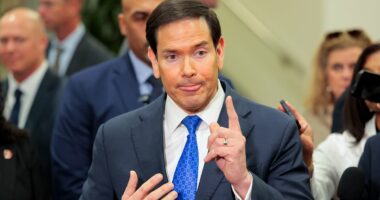Share this @internewscast.com
Nearly three years have passed since Alex Murdaugh, once a prominent figure in a powerful legal family, was sentenced to life in a South Carolina maximum-security prison.
Convicted of murdering his wife and son, Murdaugh isn’t fading into obscurity without a fight.
Currently housed in an undisclosed state prison due to his high-profile nature, the 57-year-old former attorney is actively challenging his murder conviction, with a crucial appeal potentially unfolding this spring.
Insider sources have provided the Daily Mail with an exclusive glimpse into Murdaugh’s life behind bars and his surviving son’s perspective on his father.
According to records from the South Carolina Corrections Department, Murdaugh—who is also serving concurrent sentences of 40 years for federal and 27 years for state financial crimes, in addition to his two life sentences—spends his time working as an assistant to the wardkeeper.
He has held this position since August 2023, the same month he was penalized for sharing information with a documentary team. Following this incident, he faced a 30-day suspension from phone use and purchasing items from the canteen for breaching prison regulations.
Since then, Murdaugh has managed to stay out of trouble behind bars.
According to his attorney, Dick Harpootlian, the convicted felon also spends his time squirreling away at the details of his ongoing case, hopeful for a retrial later this year. Harpootlian told the Daily Mail that Murdaugh is heavily involved in this legal battle even from the confines of his prison cell.

Alex Murdaugh (seen during his 2023 sentencing on state financial crimes) is passing the time in prison fighting his murder conviction
‘You can talk to him, unlike normal clients who have no concept of the appellate process or how all this works,’ Harpootlian said. ‘He is interested because he is a lawyer, so we talk about where we’re at and what we think the grave issues are with the case and what our weaknesses are.’
They talk every week, ‘generally and about the case,’ Harpootlian added.
Overall, Harpootlian thinks ‘he’s got a good attitude,’ is in good spirits and has largely settled into prison life.
‘I think Alex understands he did a bad thing in stealing all that money. He is adamant he didn’t kill Paul and Maggie. He always has been… and when we get a fair trial, I think the jury will determine he didn’t do it.’
Harpootlian called Murdaugh ‘hopeful’ about getting a new trial – but ‘not confident of anything.’
While Harpootlian told the Daily Mail his client regularly speaks with his surviving son, Buster Murdaugh, 32, a source close to the relative told a different story.
‘Brooklynn [White Murdaugh, Buster’s wife,] says he doesn’t visit his dad much – hardly talks to him,’ the insider told the Daily Mail.
And while his dad continues to profess his innocence, and is pinning his hopes on a second chance in court, Buster has a far less positive outlook.
‘He has a lot of anger about the loss of his mom and brother,’ the source added. ‘He doesn’t talk about them much.
‘Whether or not Alex killed them, he definitely did enough to tarnish Buster’s name forever, and he’s angry about that.’

Pictured from left: Paul, Maggie, Alex and Buster Murdaugh. Alex was convicted of murdering his wife, Maggie, and son, Paul, in June 2021

Maggie and Paul were gunned down, with two different firearms, at the dog kennels on the Murdaugh family’s Moselle estate on June 7, 2021

Murdaugh’s attorney Dick Harpootlian (pictured) told the Daily Mail about their fight for a new murder trial
According to the insider, Buster – who married long-term girlfriend Brooklynn last May – avoids talking about his family or ‘the scandal’ surrounding his father whatsoever.
‘He distances himself from it all. He hates that everywhere he goes, he’s recognized.’
As the sole survivor, Buster’s life will forever be tarnished by his father’s crimes.
The tale of Murdaugh’s spectacular fall from grace was one that captivated the public in 2023 – the trial was watched, gavel to gavel, all across the country.
This was a man who had it all, born into a powerful, wealthy family that had dominated the justice system in South Carolina’s Lowcountry for more than a century.
On June 7, 2021, Murdaugh’s wife, Maggie, 52, and younger son, Paul, 22, were found shot dead on the family’s sprawling 17,000-acre Moselle estate. That’s when the patriarch’s power and reputation began to unravel.
Other mysterious deaths tied to the prominent family entered the conversation, and his multi-million-dollar fraud schemes came to light. Murdaugh even allegedly tried to hire a hitman and stage his own shooting months after the family killings.
The double life of the prominent attorney was finally laid bare, culminating in his arrest and conviction for his wife and son’s murders.

Buster (pictured with his now-wife, Brooklynn White, and other family members during the murder trial) doesn’t often speak about what happened to his family, a source told the Daily Mail
On February 11, Murdaugh’s legal team and the South Carolina Attorney General’s Office will return to court for a showdown over his bid for a new trial.
The South Carolina Supreme Court in Columbia agreed to hear arguments from both sides, before deciding whether the Lowcountry’s so-called ‘trial of the century’ will be thrown out – and a second trial set.
Murdaugh’s fight for a retrial is chiefly based on allegations that Colleton County Clerk of Court Becky Hill tampered with the jury.
Hill pleaded guilty in December to obstruction of justice, perjury and two counts of misconduct in office, admitting to showing graphic crime scene photos to a reporter and then lying about it. She also admitted to taking bonuses and promoting her book about the trial through her public office.
Prosecutors also investigated allegations of jury tampering, but found there wasn’t evidence to prove charges. Hill, who resigned in disgrace in 2024, was handed three years’ probation.
In their appeal, Murdaugh’s team argues Hill tried to influence the jury to return a guilty verdict.
Murdaugh’s team also argues the jury should not have heard about his financial crimes.
At trial, prosecutors presented a motive that he killed Maggie and Paul to salvage his crumbling finances and reputation.
Murdaugh later pleaded guilty to a string of federal and state financial crimes, for which he is currently serving time.
‘By the time the jury heard two-and-a-half weeks of testimony about him stealing $12million from invalids and orphans, he was so vilified it didn’t matter what [Murdaugh] said on the stand, the jury wasn’t going to believe him. That’s number one,’ Harpootlian told the Daily Mail.

Pictured from left: Paul, Maggie and Buster. A source close to Buster said he has not spoken to his father much, though Harpootlian tells a different story

Murdaugh has ‘got a good attitude’ about life in prison, his attorney said, and is actively involved in his appeal from behind bars
‘Number two, we didn’t know it at the time, but it certainly makes sense now that the clerk of court was fixing the jury, trying to persuade jurors to vote guilty, because she needed a guilty verdict to sell books… those two factors totally distorted the trial.’
Prosecutors, meanwhile, argue Murdaugh was convicted because he was ‘obviously guilty’ and that the jury tampering claims were settled in 2024 by former Supreme Court Justice Jean Toal, who, while condemning Hill’s actions, said she did not impact the verdict.
Harpootlian insisted to the Daily Mail that he still firmly believes in Murdaugh’s innocence – and stands by his theory that two shooters committed the double murder.
‘There is strategic evidence to indicate that’s correct,’ he said.
‘Two different guns shooting two different people… The forensics supports two people [committing the crime].
‘But that’s something we’d have to deal with in a second trial.’
But, for now, life on the inside doesn’t seem to be going too badly for Murdaugh.
















